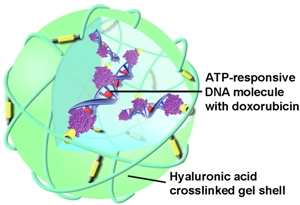Biomedical engineering researchers have developed a new technique that uses adenosine-5'-triphosphate (ATP), the so-called "energy molecule," to trigger the release of anti-cancer drugs directly into cancer cells. Early laboratory tests show it increases the effectiveness of drugs targeting breast cancer. The technique was developed by researchers at North Carolina State University and the University of North Carolina at Chapel Hill.
 The nanoparticles are packed with DNA molecules that are embedded with an anti-cancer drug called doxorubicin. Image: Ran Mo.
The nanoparticles are packed with DNA molecules that are embedded with an anti-cancer drug called doxorubicin. Image: Ran Mo.
"This is a proof of concept, but we've demonstrated there is now a new tool for introducing anti-cancer drugs directly into cancer cells – and that should make drug treatments significantly more effective," says Dr. Zhen Gu, senior author of a paper on the research and an assistant professor in the joint biomedical engineering program at NC State and UNC-Chapel Hill.
Gu's research team developed spherical nanoparticles coated with a shell that incorporates hyaluronic acid (HA), which interacts with proteins found on the surface of some cancer cells. When a targeted cancer cell comes into contact with the HA, the cell absorbs the entire nanoparticle.
Once inside the cancer cell, the nanoparticle's shell comes apart, releasing its payload: a collection of complex DNA molecules that are embedded with an anti-cancer drug called doxorubicin (Dox), which targets the nucleus of the cancer cell.
The DNA molecules are designed to unfold – and release the Dox – only when they come into contact with high ATP levels. High levels of ATP are normally only found inside a cell, which means the Dox is released within striking distance of the nucleus – and not inadvertently released outside the cell.
"This is the first time ATP has been used as a molecular trigger for controlled release of anti-cancer drugs, both in vitro and in vivo," says Dr. Ran Mo, lead author of the paper and a postdoctoral researcher in the joint biomedical engineering program. ATP transports chemical energy within cells for metabolism.
In in vitro testing, the new technique was 3.6 times more effective against MDA-MB-231 human breast cancer cells than techniques that don't incorporate an ATP-targeting component.
The researchers also tested the new technique in an in vivo model, using mice that had breast cancer tumors. The researchers found that the ATP-targeting technique was significantly more effective at inhibiting tumor growth compared with other techniques.
"We also believe that we'll be able to make the technique even more targeted by manipulating ATP levels in specific areas," Gu says.
Source: http://www.ncsu.edu/